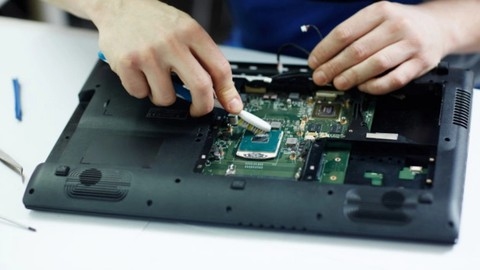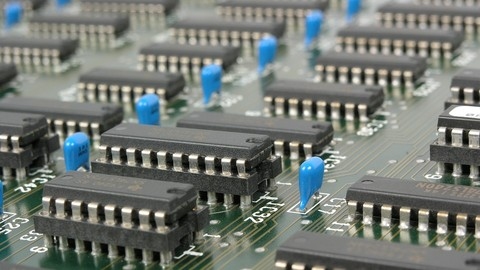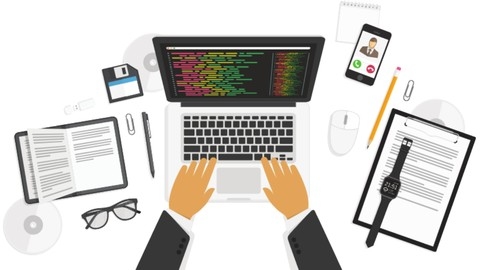Computer engineering is a dynamic field that delves into the design, development, and testing of the physical components that make up computers and other digital devices.
From processors and memory to storage devices and peripherals, hardware engineers play a crucial role in shaping the technological landscape we interact with daily.
By learning computer engineering, you gain a deep understanding of how computers function at their core, enabling you to design, build, and troubleshoot complex systems.
This knowledge opens doors to exciting career opportunities in areas like embedded systems, robotics, and even artificial intelligence.
Finding the right course to guide you on your computer engineering journey can be a challenge, given the abundance of options available online.
You’re seeking a comprehensive program that covers both theoretical concepts and practical applications, taught by experienced instructors who can impart their expertise effectively.
For the best computer engineering course overall on Udemy, we recommend the Computer Hardware Engineering Certification Training.
This comprehensive course offers a structured curriculum covering everything from fundamental concepts like computer architecture and memory management to advanced topics such as pipelining and communication buses.
The practical approach, including schematics design and performance evaluation, ensures you gain hands-on experience essential for success in the field.
While Computer Hardware Engineering Certification Training stands out as our top pick, there are other valuable courses available on Udemy that cater to various learning styles and specific interests within computer engineering.
Keep reading to explore our curated list of recommendations and find the perfect course to embark on your hardware engineering adventure.
Computer Hardware Engineering Certification Training
This Computer Hardware Engineering Certification Training by Uplatz equips you with the essential knowledge and skills to break into the competitive field of computer hardware engineering.
The course curriculum guides you through a comprehensive exploration of computer hardware, starting with the fundamentals of how computers work.
You’ll delve into topics like computer architecture, memory management, and the intricacies of processors and their role in executing instructions.
The course doesn’t just stop at theory.
You’ll learn about the different types of memory, such as cache and their impact on computer performance.
You’ll also gain a deep understanding of disk drives, including how they store data and the role of file systems like NTFS.
You’ll explore essential concepts such as pipelining and Instruction Level Parallelism (ILP) which are crucial for understanding how modern processors achieve their impressive speeds.
The course takes a practical approach to learning, teaching you how to design and test computer hardware.
You’ll develop valuable skills in creating schematics and blueprints for new hardware systems and discover how to evaluate the performance of electronic circuits and assemblies.
You’ll also learn about communication buses and bridges, components that facilitate communication between different parts of a computer system and gain insights into the world of peripherals such as monitors and printers.
Digital Computer Electronic Engineering Circuit Simulations
This course starts you off with digital circuits.
You will begin by learning about fundamental logic gates, the basic switches in computers that control the flow of signals.
These gates are the basis of digital logic circuits.
You will discover how these gates use electrical signals to represent data.
You then get hands-on experience building and testing these gates using simulation software, a critical skill for any aspiring computer engineer.
You will dive into Boolean Algebra, a system of mathematical logic that is essential for designing and analyzing digital circuits.
Boolean Algebra helps you understand how different logic gates work together to process information.
Then you’ll learn about Demorgan’s Theorems, powerful tools for simplifying complex logic expressions.
This simplification is crucial for designing efficient and cost-effective circuits.
You will then explore combinational logic, a type of digital circuit where the output is determined by the combination of inputs.
You learn how to use Karnaugh mapping, a graphical method to simplify complex logic circuits and make them easier to understand and design.
This course will give you a strong foundation in the core principles of digital computer engineering and the skills to design and analyze digital circuits.
Computer Engineering Mastery: From Beginner to Expert!
This computer engineering course is designed for anyone looking to gain a comprehensive understanding of computers, from their historical roots to modern programming applications.
You’ll embark on a journey beginning with the basic components of a computer, including the CPU, memory, and storage, and delve into the critical role of the operating system and its various types.
The course then introduces you to the fascinating world of data representation, exploring bits, bytes, and the binary system that underpins computer language.
Next, you’ll dive into the world of networking, exploring concepts like LANs, WANs, and the internet protocol, and discover how computers communicate with each other.
The course then unveils the intriguing realm of semiconductors, exploring diodes, transistors, and their use in building logic gates, the fundamental building blocks of digital circuits.
You’ll delve into Boolean algebra, binary arithmetic, and learn how to simplify logic circuits using Karnaugh maps.
You’ll then explore fundamental electrical concepts like resistance, capacitance, and inductance, gaining a solid understanding of electrical circuits.
Building on this, the course guides you through digital logic design, teaching you about flip-flops, decoders, multiplexers, and counters, essential components for building complex digital systems.
You’ll then venture into the heart of computer systems, exploring computer organization and architecture, understanding instruction cycles, addressing modes, and the interaction between the CPU and memory.
Finally, the course culminates with an introduction to the exciting world of programming using Python.
You’ll learn about variables, data types, control flow mechanisms like loops and conditional statements, and how to define and use functions to create reusable blocks of code.
The course then introduces you to object-oriented programming, delving into concepts such as classes, objects, inheritance, and polymorphism.
You’ll also learn about file handling, exception handling, and best practices in Python programming.
Computer Engineering Excellence: Practice Run
This course guides you through the exciting world of computer engineering, starting with the fundamentals.
You will explore the essential building blocks of computers, like hardware and software.
This foundation prepares you to understand how computer systems operate.
As you progress, you will discover the language of computers, including binary numbers and Boolean logic.
You will learn how these concepts form the basis of digital circuits, the backbone of all computing devices.
With this knowledge, you will be able to analyze problems, design circuits, and even write code - all essential skills for a successful computer engineer.
Building on the fundamentals, you will delve into the intricate world of computer architecture and operating systems.
You will discover how computers process information, manage memory, and interact with the outside world.
This deeper understanding will provide you with a solid foundation for a career in this ever-evolving field.
Also check our posts on:




